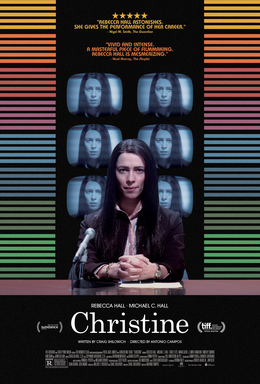Movie "Christine" - Women as Feminism's Roadkill
February 10, 2019
(left, Rebecca Hall as Christine)

Christine Chubbuck (1944-1974) was an American
television news reporter who worked for
WXLT-TV in Sarasota Florida. The station manager
preached an "if it bleeds, it leads" news policy.
In protest against that and life going nowhere,
she became the only person ever to blow her brains out on live-TV.
Despite bombing at the box office,
Christine was a critical hit. Rebecca Hall's performance
as a feminist wrestling with conflicting desires and instincts is flawless and deserved an academy award. Like many feminists, Christine could not compete with men and also find a spouse. The cyst on her ovary symbolizes her masculine mindset. The directing, writing and acting are excellent. Available on Netflix and Prime, this is an uncomfortable watch. At 120 min, the movie is also 30 min too long. However, it deserves notice because it is true to life, i.e. not politically correct. Ray M, who alerted me to it, writes:
"I know a 'Christine', and I've known a handful like her. They may not have committed suicide, but they are as depressed, lost, and lonely as that poor girl was."
by Ray M
(henrymakow.com)
Christine (2016) is not the Steven King movie. This is a horror story of another kind. I would call it a cautionary tale about a victim of ideological possession.
The movie caught me completely off-guard. I found out about it while researching a movement called Transactional Analysis, a psychological therapeutic modality introduced in the United States during the 1960s. I had assumed that this movie might be a feel-good story about people that were helped by T.A., or perhaps an expose on those it harmed. Neither was the focus of this film.
The story is about Christine Chubbuck, a single woman who works in a local television newsroom. She is nearing thirty and her career seems to have stalled. She wants to do positive human interest stories, but the big boss, concerned about his failing station, wants to focus on crime, murder, and sensationalism..."If it bleeds, it leads", was his motto.
On looking into her personal history I discovered that she attended an elite private girl's high school in a neighbouring community to my own, and upon graduation went on to attend three different liberal arts colleges, each one further and further away from her home in Ohio.
Christine had difficulty relating to men. She had difficulty making female friends too. Her focus seemed to always be her work.
Christine was funny, creative, and great with kids. When not at the television station she would volunteer at the Sarasota Memorial Hospital, giving puppet shows to children with intellectual disabilities.

In spite of an excellent performance by Rebecca Hall, we don't get to know Christine Chubbuck very well. Clearly, she is depressed, lonely, and suffers from some troubling events in her past. She also suffers from pains in her abdomen which she keeps dismissing as "just stress".
When she finally goes to a doctor, she learns she has a tumour on one of her ovaries and that she will have to have the ovary removed, which could reduce her chances of conceiving a child in the future.
Her father is never mentioned in the story. Christine now lives with her mother, and accuses her of neglect, by filling her head with "hippie bullshit", and not helping her to understand how the world works. Christine's bedroom looks like that of a ten-year-old girl.
She has a crush on the station's anchorman, but he views her as a colleague, possibly as a friend. At one point he tries to help her by introducing her to the Transactional Analysis group that he attends. During an exercise called "yes, but", Christine reveals that she has always dreamed of being married, and having children, with a career as a third-place finisher.
The movie hints at mental illness as the cause for what befell this woman, but never really says what it was.
Personally, I look for patterns in stories, and I trust what my gut tells me about the available information. I know what I think possessed her.
Some may call it a mental illness, others would call it an ideology.
There is one remaining fact however that sealed my suspicions about the nature of her "illness". This was the way the director shot the final scene, which to me indicated that he too had come to a particular conclusion about the fate of this poor woman.
Viewers will have to decide for themselves what the truth may be.
----------------






